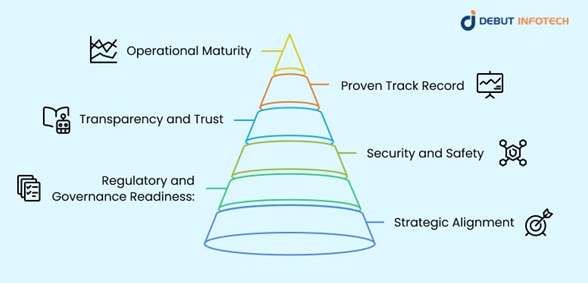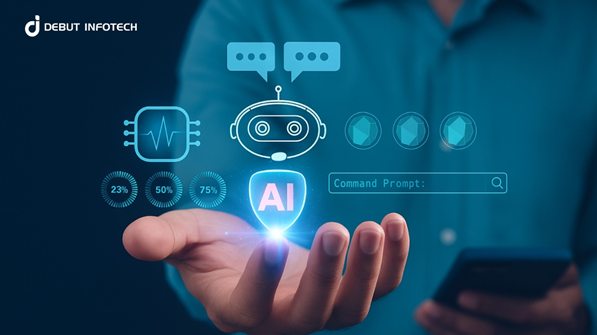Are you looking for a reliable AI agent development company to help your business build and integrate AI into your existing business processes?
You’re not alone. Many businesses today are seeking cost-effective ways to leverage the benefits of AI agents without incurring millions in unnecessary expenses.
At the same time, the market is crowded with AI agent companies claiming to be able to build the best AI agents capable of taking your business to the next level.
So, how do you separate the capable strategists from the sales talkers?
You simply have to look out for some critical indicators, and this article provides a practical executive checklist of these indicators for you to screen every AI agent development firm before committing your business’s AI agent development project to them.
Think of it as your due diligence guide: the questions to ask, the red flags to spot, and the assurances to expect. Let’s start with the first checkpoint—strategic alignment.

1. Strategic Alignment: An Understanding of Your Business Goals
When hiring an AI agent development firm, the first thing you need to check is whether the vendor speaks your language.
Some vendors try to look all sophisticated by using cumbersome technical terms that you probably don’t understand all just to drive up their valuation. You don’t want those.
Venturing into AI is about solving pressing business problems. Therefore, you need to choose an AI development company that understands your business. More importantly, they need to be able to concisely explain how agentic AI could streamline your operations, reduce costs, and unlock new revenue.
Here’s one sure way to test if a vendor understands your business goals: Ask them to discuss how building an AI agent can help you solve a core business challenge like customer retention and the measurable outcomes to look out for. If they just jump into technical jargon without addressing any of your business KPIs, then that’s a red flag.
The best AI agent companies often frame pilots as proof points tied to ROI to ensure that you’re building technical infrastructures with real business impacts.
2. Regulatory and Governance Readiness: Future-readiness
In response to the immense capabilities of AI models and systems, regulatory bodies worldwide are becoming stricter with AI regulations. If your business utilizes AI systems that do not comply with relevant regulations, you will expose the organization to serious legal risks. Some of these regulations include the EU AI Act, NIST’s AI Risk Management Framework, and ISO/IEC 42001
However, you can’t simply ask an AI Vendor if they follow these guidelines and expect to get an honest answer every time. After all, they are after your business, and would likely say what they have to say to get that agreement.
So, here’s what you do: ask them to provide their operational roadmap for ensuring regulatory and governance readiness. Look out for the following in their responses:
- Clear details on how they ensure AI models are explainable
- Clear procedures for handling bias detection and data consent
- Proven compliance pathways
- Workflows that are guided by governance procedures
A response with these core elements demonstrates that the agentic AI vendor doesn’t treat regulatory and governance readiness as an afterthought, but rather as a core guiding principle for all their processes. As such, they rarely expose a business to long-term legal, reputational, and operational risks. That’s the kind of Agentic AI vendor you should go for!
3. Security and Safety: Adequate Preparation for and Protection Against AI Risks
As Elon Musk once said, “AI is likely to be either the best or worst thing to happen to humanity.” This claim highlights some of the security and safety issues that AI agents pose, particularly when not properly addressed. Some of these include prompt injection (tricking an agent into harmful behavior) and data leakage (accidentally exposing sensitive information).
Therefore, you need to be sure the AI agent development form that will be working on your AI development project is responsible enough to mitigate these risks. You can get a pretty good idea by asking them questions like the following:
- How do you sandbox agent interactions with tools?
- What safeguards are in place to prevent misuse?
- How is sensitive data encrypted and monitored?
You need to get clear and satisfactory answers to these questions because once the vendor builds and integrates the AI system with your existing infrastructure, you’re potentially exposing your entire organization to any vulnerabilities that may come with the AI agents.
Furthermore, you should also ask about situations where this vendor has protected its AI agents from real-world threats, how they approached it, and the measurable outcomes they achieved. Reliable AI agent companies are often able to demonstrate this track record with verifiable examples.
4. Transparency and Trust: Full Disclosure
When selecting a vendor, you shouldn’t just go for a company that delivers an AI model that “just works.” They must also be able to provide visibility into how the models are trained, what data is used, and the system’s limitations.
Wondering why this matters?
You need to know all these intricate details to ensure that you are well-informed about the risks the AI models you’re deploying pose. From legal exposures and bias risks to system vulnerabilities, a transparent and trustworthy agentic AI vendor keeps you informed about all valuable information.
Best-in-class AI agent companies often provide “model cards” that outline performance metrics, biases, and use cases, as well as “datasheets for datasets” that explain where training data originated.
Therefore, as an executive or decision-maker approving the move to choose a particular AI Agent Development Company, you should ask to see their reporting templates, And if they resist or give vague assurances, it’s a signal that they may not have mature governance in place, and that’s something you can’t afford in today’s regulatory climate.
5. Proven Track Record: Relevant and Demonstrable Results
This is perhaps a very obvious one: a credible AI agent development company must be able to show actual case studies (preferably related to your line of business) and references that prove that this isn’t their first rodeo and that they have had measurable impacts with similar projects.
More importantly, when looking at their case studies, it’s not enough for them to have done something similar in the past. They must also have helped reach outcomes that are tied to tangible business KPIs. For example, look out for numbers that show their AI models help other businesses reduce call center costs, increase sales conversions, or speed up supply chain operations. In a nutshell, ensure that they can show that their AI development operations aren’t just a form of technical novelty but are tied to financial or operational metrics.
Here’s a simple exercise to test this:
Ask the AI vendor the following questions:
- What was the business challenge?
- How did you structure the solution?
- What was the ROI?
The ideal vendor for you is the one that can connect the dots via their responses.
6. Operational Maturity: Ability to Scale from Pilot to Production
Operational maturity refers to the consistency, reliability, and resiliency of the company’s AI development process. The goal of this factor is to test whether the company can effectively implement a theoretically promising AI agent idea when deployed at scale.
Best-in-class AI development services, such as those offered by Debut Infotech Pvt Ltd, ensure this by following MLOps best practices. This means that they version models, track data changes, monitor for drift, and set up automated rollbacks if something goes wrong. Again, this is something that tells you that when approaching AI development, the “how” is equally as important as the ability of an AI model to function.
Working with an operationally mature AI Agent development company increases your chances of moving a project beyond a demo to a full-fledged product that your business can count on.
So, how do you assess the operational maturity of the AI agent companies you’re vetting?
Simply ask how they handle updates, monitoring, and long-term maintenance. Have they taken another client’s AI system from pilot to enterprise-scale deployment? Their answer will tell you whether they’re builders of sustainable systems or just prototype shops looking for the next project.
Conclusion: Choose Partners, Not Just Vendors
There you have it!
Your vendor checklist for handpicking the perfect AI agent development firm.
Look out for:
- Business alignment
- Regulatory readiness
- Security safeguards
- Transparency
- Operational maturity
- Proven results
When you start to screen different AI vendors for these qualities, you’ll realize that the best agentic AI vendors don’t simply build models; they deliver trusted solutions that generate measurable value, scale responsibly, and adapt to fast-changing regulations.
That’s why you need to view this decision-making process from a slightly different lens. Instead of thinking of it as choosing a vendor, consider it a partner selection process. That’s because you need a long-term partner who understands both the technical complexities and the business realities of AI adoption. This is exactly what an AI Agent Development Company like Debut Infotech Pvt Ltd offers. They blend deep technical expertise with a strong commitment to governance, security, and ROI-driven outcomes.


